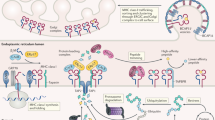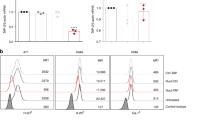Abstract
The T-cell response against cancer is dependent on the cell surface presentation of tumor-associated or tumor-specific peptides by major histocompatibility complex (MHC) class I molecules. We found that tapasin, a chaperone protein that normally assists in the assembly of MHC class I molecules, is undetectable in an unstimulated pancreatic tumor cell line, Panc02, and only very weakly expressed after γ-interferon stimulation. Transfection of tapasin into the Panc02 cells did not quantitatively increase MHC class I surface expression or detectably affect MHC class I association with peptide and β2-microglubulin (β2m). However, we found that transfected tapasin downregulated immune reactivity against a model tumor antigen, MUC1. Although tapasin has been previously shown by others to increase immune recognition of particular antigens, our results suggest that tapasin has a negative impact on the presentation of an immunodominant epitope from a specific model tumor antigen.
Similar content being viewed by others
REFERENCES
Pamer E, Cresswell P: Mechanisms of MHC class I-restricted anti-gen processing. Annu Rev Immunol 16:323–358, 1998
Carreno BM, Solheim JC, Harris M, Stroynowski I, Connolly JM, Hansen TH: TAP associates with a unique class I conformation, whereas calnexin associates with multiple class I forms in mouse and man. J Immunol 155:4726–4733, 1995
Harris MR, Yu YYL, Kindle CS, Hansen TH, Solheim JC: Calreticulin and calnexin interact with different protein and glycan deter-minants during the assembly of MHC class I. J Immunol 160:5404–5409, 1998
Ortmann B, Androlewicz MJ, Cresswell P: MHC class I/?2-microglobulin complexes associate with TAP transporters before peptide binding. Nature 368:864–867, 1994
Suh W-K, Cohen-Doyle MF, Früh K, Wang K, Peterson PA, Williams DB: Interaction of MHC class I molecules with the transporter associated with antigen processing. Science 264:1322–1326, 1994
Garbi N, Tan P, Diehl AD, Chambers BJ, Ljunggren H-G, Momburg F, Hämmerling GJ: Impaired immune responses and altered peptide repertoire in tapasin-deficient mice. Nat Immunol 3:234–238, 2000
Grandea AG III, Golovina TN, Hamilton SE, Sriram V, Spies T, Brutkiewicz RR, Harty JT, Eisenlohr LC, Van Kaer L: Impaired assembly yet normal trafficking of MHCclass I molecules in tapasin mutant mice. Immunity 13:213–222, 2000
Dissemond J, Kothen T, Mors J, Weimann TK, Lindeke A, Goos M, Wagner SN: Downregulation of tapasin expression in progressive human malignant melanoma. Arch Dermatol Res 295:43–49, 2003
Weinman EC, Roche PC, Kasperbauer JL, Cha SS, Sargent DJ, Cheville J, Murphy LM, Chen L, Wettstein PJ, Gostout B, Ferrone S, Strome SE: Characterization of antigen processing machinery and surviving expression in tonsillar squamous cell carcinoma. Cancer 97:2203–2211, 2003
Delp K, Momburg F, Hilmes C, Huber C, Seliger B: Functional deficiencies of components of the MHC class I antigen pathway in human tumors of epithelial origin. Bone Marrow Transplant 25(Suppl 2):S88–S95, 2000
Seliger B, Schreiber K, Delp K, Meissner M, Hammers S, Reichert T, Pawlischko K, Tampé R, Huber C: Downregulation of the constitutive tapasin expression in human tumor cells of distinct origin and its transcriptional upregulation by cytokines. Tissue Antigens 57:39–45, 2001
Yu YYL, Turnquist HR, Myers NB, Balendiran GK, Hansen TH, Solheim JC: An extensive region of an MHC class I ?2 domain loop influences interaction with the assembly complex. J Immunol 163:4427–4433, 1999
Van Endert PM, Tamp´ e R, Meyer TH, Tisch R, Bach JR, McDevitt HO: A sequential model for peptide binding and transport by the transporters associated with antigen processing. Immunity 1:491–500, 1994
Price MR, Rye PD, Petrakou E, Murray A, Brady K, Imai S, Haga S, Kiyozuka Y, Schol D, Meulenbroek MF, Snijdewint FG, Von Mensdorff-Pouilly S, Verstraeten RA, Kenemans P, Blockzjil A, Nilsson K, Nilsson O, Reddish M, Suresh MR, Koganty RR, Fortier S, Baronic L, Berg A, Longenecker MB, Hilgers J: Summary report on the ISOBM TD-4 Workshop: Analysis of 56 monoclonal antibodies against the MUC1 mucin. Tumor Biol 19:1–20, 1998
Hämmerling GJ, Hämmerling U, Lemke H: Isolation of twelve monoclonal antibodies against Ia and H-2 antigens: Serological characterization and reactivity with Band T lymphocytes. Immunogenetics 8:433–445, 1979
Hämmerling GJ, Rusch E, Tada N, Kimura S, Hämmerling U: Localization of allodeterminants on H-2K b antigens determined with monoclonal antibodies and H-2 mutant mice. Proc Natl Acad Sci USA 79:4737–4741, 1982
Ozato K, Hansen TH, Sachs DH: Monoclonal antibodies to mouse MHC antigens. II. Antibodies to the H-2L d antigen, the product of a third polymorphic locus of the mouse major histocompatibility complex. J Immunol 145:2473–2477, 1980
Smith JD, Solheim JC, Carreno BM, Hansen TH: Characterization of class I MHCfolding intermediates and their disparate interactions with peptide and ?2-microglobulin. Mol Immunol 32:531–540, 1995
Corbett TH, Roberts BJ, Leopold WR, Peckham JC, Wilkoff LJ, Griswold DP Jr, S chabel FM Jr: Induction and chemotherapeutic response of two transplantable ductal adenocarcinomas of the pancreas in C57BL/6 mice. Cancer Res 44:717–726, 1984
Morikane K, Tempero RM, Sivinski CL, Nomoto M, VanLith ML, Muto T, Hollingsworth MA: Organ-specific pancreatic tumor growth properties and tumor immunity. Cancer Immunol Immunother 47:287–296, 1999
Li S, Sjögren H-O, Hellman U, Pettersson RF, Wang P: Cloning and functional characterization of a subunit of the transporter associated with antigen processing. Proc Natl Acad Sci USA 94:8708–8713, 1997
Karre K, Ljunggren HG, Piontek G, Kiessling R: Selective rejection of H-2-deficient lymphoma variants suggests alternative immune defence strategy. Nature 319:675–678, 1986
Seliger B, Ritz U, Abele R, Bock M, Tamp´ e R, Sutter G, Drexler I, Huber C, Ferrone S: Immune escape of melanoma: First evidence of structural alterations in two distinct components of the MHC class I antigen processing pathway. Cancer Res 61:8647–8650, 2001
Purcell AW, Gorman JJ, Garcia-Peydro M, Paradela A, Talbo GH, Burrows SR, Laham N, Peh CA, Reynolds EC, Lopez de Castro JA, McCluskey J: Quantitative and qualitative influence of tapasin on the class I peptide repertoire. J Immunol 166:1016–1027, 2001
Qin Z, Harders C, Cao X, Huber C, Blankenstein T, Seliger B: Increased tumorigenicity, but unchanged immunogenicity, of trans-porter for antigen presentation 1-deficient tumors. Cancer Res 62:2856–2860, 2002
Huang AY, Golumbek P, Ahmadzadeh M, Jaffee E, Pardoll D, Levitsky H: Role of bone marrow-derived cells in presenting MHC class I-restricted tumor antigens. Science 264:961–965, 1994
Yewdell JW, Norbury CC, Bennink JR: Mechanisms of exogenous antigen presentation by MHC class I molecules in vitro and in vivo: Implications for generating CD8+ T cell responses to infectious agents, tumors, transplants, and vaccines. Adv Immunol 73:1–77, 1999
Sivinski CL, Kohlgraf KG, VanLith ML, Morikane K, Tempero RM, Hollingsworth MA: Molecular requirements for CD8-mediated rejection of a MUC1-expressing pancreatic carcinoma: Implications for tumor vaccines. Cancer Immunol Immunother 51:327–340, 2002
Huang AY, Bruce AT, Pardoll DM, Levitsky HI: Does B7-1 expression confer antigenpresenting cell capacity to tumors in vivo? J Exp Med 183:769–776, 1996
Turnquist HR, Thomas HJ, Prilliman KR, Lutz CT, Hildebrand WH, Solheim JC: HLA-B polymorphism affects interactions with multiple endoplasmic reticulum proteins. Eur J Immunol 30:3021–3028, 2000
Turnquist HR, Schenk EL, McIlhaney MM, Hickman HD, Hilde-brand WH, Solheim JC: Disparate binding of chaperone proteins by HLA-A subtypes. Immunogenetics 53:830–834, 2002
Peh CA, Burrows SR, Barnden M, Khanna R, Cresswell P, Moss D, McCluskey J: HLA-B27 restricted antigen presentation in the absence of tapasin reveals polymorphism in mechanisms of HLA class I-peptide loading. Immunity 8:531–542, 1998
Author information
Authors and Affiliations
Rights and permissions
About this article
Cite this article
Turnquist, H.R., Kohlgraf, K.G., McIlhaney, M.M. et al. Tapasin Decreases Immune Responsiveness to a Model Tumor Antigen. J Clin Immunol 24, 462–470 (2004). https://doi.org/10.1023/B:JOCI.0000029118.51587.d9
Issue Date:
DOI: https://doi.org/10.1023/B:JOCI.0000029118.51587.d9




